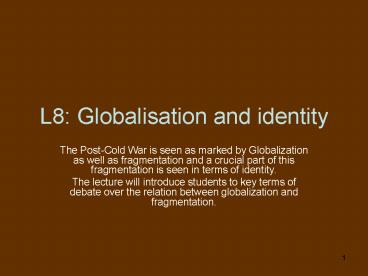L8: Globalisation and identity - PowerPoint PPT Presentation
1 / 14
Title:
L8: Globalisation and identity
Description:
Are questions about Identity important for understanding world politics ... Conflicts as based on ancient hatreds' (politics of representation) ... – PowerPoint PPT presentation
Number of Views:143
Avg rating:3.0/5.0
Title: L8: Globalisation and identity
1
L8 Globalisation and identity
- The Post-Cold War is seen as marked by
Globalization as well as fragmentation and a
crucial part of this fragmentation is seen in
terms of identity. - The lecture will introduce students to key terms
of debate over the relation between globalization
and fragmentation.
2
- Are questions about Identity important for
understanding world politics - Is gender relevant for understanding nationalism?
- Is Globalisation leading to an eclipse of
nationalism?
3
- IR and identity
- Nationalism as a primary form of identity
- Understanding nationalism
- Gender and Nationalism
- Post-Cold War conflicts
- a resurgence of nationalism/ethnicity/religion?
Ancient hatred vs modern constructs - Globalisation, Nationalism and Identity
4
IR and identity
- Read Zalewski and Enloes chapter Questions
about identity in International Relations - Identity questions and questions about identity
- Who are we in IR?
- The international politics of identity
construction - US and UK invaded and occupied Iraq.
- What is US, UK and Iraq?
5
Nationalism as a primary form of identity
- Why study nationalism?
- Negative notion?
- Banal nationalism (Billig, Michael, Banal
Nationalism, London Sage, 1995) - Nation
- Nation as a collection of people who come to
believe that they have been shaped by a common
past and are destined to share a common future.
- Nationalism
- Nationalism is a commitment to fostering those
beliefs and promoting policies which permit the
nation to control its own destiny. (Enloe in
Bananas, Beaches, and Bases, 2000) - State versus nation
- Nation-state
- Non-coincidence of nation and state
6
Theories of nationalism
- Primordialist positions
- Natural
- Essentialist
- Perennialist
- Instrumentalist positions
- Modernisation
- Political, economic, cultural transformation
(Hobsbawm, Gellner, Nairn) - Elite role
- Anti-colonialism
- Andersons Imagined political community and
imagined as both limited and sovereign
7
- Ethno-symbolist position
- in-between
- Ethnie (Anthony Smith)
- Eurocentrism and gender-blindedness of most of
these positions - Eg. Partha Chatterjee Nira Yuval-Davis
8
Gender and nationalismWomen and nationalism
- Five major ways in which women have participated
in ethnic and national process1 - As biological reproducers of members of ethnic
collectivities - As reproducers of the boundaries of
ethnic/national groups - As participating centrally in the ideological
reproduction of the collectivity and as
transmitters of its culture - As signifiers of ethnic/national differences
- As active participants in national struggles.
1 Yuval-Davis, Nira and F Anthias (eds)
Woman-Nation-State (London Macmillan, 1989). - Eg. Volksmoeder in Afrikaner nationalism (Ideal
motherhood) mother in Zulu nationalism
domesticated woman in Victorian
nationalism/imperialism and during end of
colonialism bhadra mahila in Bengali
nationalism Reclaiming manhood
(Israeli-Palestinian conflict)
9
Propositions on nationalism
- There can be no general theory of nationalism
- There is no one nationalism
- What unites different nationalism is the
discourse and rhetoric of nationhood - The nationalist discourse can only be
effectively produced on a daily basis - Any study of national identity should
acknowledge differences of ethnicity, gender,
sexuality, class or place.
10
- Nation-building
- Conflicts as based on ancient hatreds (politics
of representation) - Contesting the nation rise of ethnic and
religious conflicts - Ethnic cleansing as outrage peculiar to
nationalist dementia or totalitarian power - Ethnic cleansing as not-so-uncommon part of
nationalist consolidation - Contesting nationalisms
11
Identity and politics of violenceAncient hatred
vs modern constructs
- Rwanada genocide 1994
- Ancient hatred
- Nation-building
- Logic of colonialism fixing identity,
politicising indigeneity, divide-and-rule,
settler violence against natives and native
violence against settlers - Role of international development
- Role of Church
- Role of external states including UK
- http//www.pupress.princeton.edu/chapters/s7027.pd
f
12
Globalisation, nationalism, and identity politics
(IP)
- Globalisation as anti-thesis of nationalism/IP
- Globalisation as challenging nationalism and
promoting other IP - Globalisation as leading to reactions in the
form of resurgence of nationalism/IP - Globalisation as re-enforcing nationalism/IP
- Globalisation as transforming nationalisms/IP
13
Assessing identity politics
- A negative force
- A positive force
- Gender and Globalization
- http//www.un.org/Pubs/chronicle/2000/issue2/0200p
69.htm
14
Exam preparation
- Limitations of the mainstream IR theories
- In what ways do reflectivist theories offer a
different understanding? - Read http//www.oup.com/uk/booksites/content/01992
71186/ (look for ch. 12 or directly go to - http//www.oup.com/uk/booksites/content/0199271186
/ch12.PDF?version1 - Globalization and Nationalism
- Relevance of gender for concepts such as
nationalism or globalization































